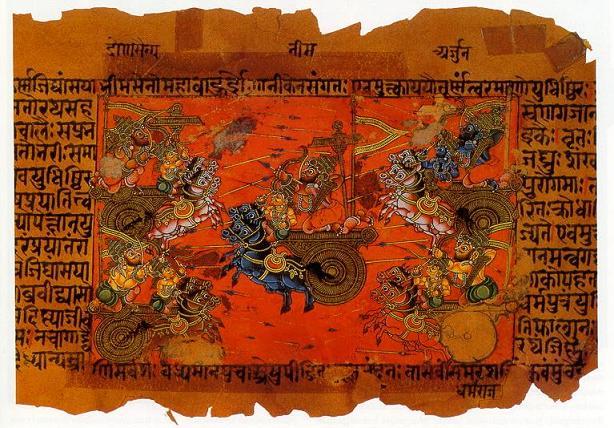
Please find the earlier review of the same novel i wrote a few years back: Parva: An epic masterpiece – Brown Pundits
Spoilers ahead
The futility of war really comes through in the retelling of by SL Byrappa in the final act. A brief summary of the final act with climax I had missed the first time around.
Bhima goes over to Hidimba forest, only to find out that some of his fellow Arya have burned up the forest like the Pandavas had done all those years ago in the Khandav-Van. Life comes a full cycle for him, similar to Takshak killing Parikshit in the original epic. We descendants of Vaidik Aryas have to swallow a bitter pill as we look back with Bhimasen at the ways in which our forefathers brought forest land under cultivation.
अ॒ग्निमी॑ळे पु॒रोहि॑तं य॒ज्ञस्य॑ दे॒वमृ॒त्विज॑म् । होता॑रं रत्न॒धात॑मम् ॥ (RV 1.1)
Kṛṣṇa looks at the tsumani swallowing his Dwarka, as the alcohol fueled Yadava fratricide looms.
ओ॒षमित्पृ॑थि॒वीम॒हं ज॒ङ्घना॑नी॒ह वे॒ह वा॑ । कु॒वित्सोम॒स्यापा॒मिति॑ ॥
दिवि मे अन्यः पक्षोऽधो अन्यमचीकृषम् । कुवित्सोमस्यापामिति ॥ (RV 10.119)
Yudhistir finds it tough to negotiate with his subjects devastated by war. All his wisdom and experience appears futile as he stares at the tough task for rebuilding the broken realm. He is conversing with delegates from Kṛṣṇa Dvaipayana’s hermitage which include a couple of Nastikas (Carvakas/Lokayatas). These Nastikas who have challenged even Dvaipayana’s pupils make a mockery of DharmaRaja.
यावत् जीवेत् सुखम् जीवेत्।
ऋणं कृत्वा घृतं पिबेत्।
भस्मिभूतस्य देहस्य पुनरागमनं कुतः।
Arjun, the epitome of a Kshatriya, is tired, impotent and melancholic on the banks of the Ganga. After Ashwatthama’s carnage, Uttara’s womb is the only prospective heir to the Kuru clan. But in a twist (consistent with some versions of MBh) in the Parva’s final act, Uttara gives birth to a stillborn baby. Even before the blood for the delivery begins to dry, Kunti voices her thoughts of having the heir via Uttara via Niyog, (with Arjun having lost his virility and Draupadi past her fertility) only to be reject by the Draupadi. Ironically the war has made thousands of women pregnant, who knock at Yudhistir’s doors seeking fathers for their unborn children.
Unto thy womb let a fœtus come, a male one, as an arrow to a quiver;
let a hero be born unto thee here, a ten-months’ son
Give birth to a male, a son; after him let a male be born;
mayest thou be mother of sons, of those born and whom thou shalt bear. – AV 3.23
Both traditional and scholarly accounts of Mbh agree that Parikshit and his son Janamejaya were very important Kuru rulers. The Vaidik religion which went on to become Hinduism was formalised and systemized during the reigns of the Kuru kings. Vichitravirya, Dhritarashtra, Parikshit, Janamejaya all find references in the Vedic canon (but not Yudhistir). The Kuru domination is said to have spread the Vaidik orthopraxy in all directions from its base in Kuru-Pancala region. The partitioner of Vedas, Vyasa also is said to have resided in the Kuru-Pancala region. Thus even though Ramayana probably has a higher standing in minds of Hindus today, we can say Mahabharat is truly our National Epic. It details the birth of our civilization, making way for formation of the “first” known STATE with the bounds of Indian geography
In a sense, the throne of Hastinapur and Indraprastha passing on the grandson of Arjun & Kṛṣṇa who is also incidentally related to Satyavati via Uttara is the final climatic event of the epic. This is where Byrappa adds a climatic twist (which i had not noticed in the first 2 readings).
Just before the war starts, while Bhisma is pondering over the morality of Niyog and Arya Dharma, he encounters an Ironsmith family fleeing the ravages of war against the royal orders. Bhisma is so entranced by the pregnant mother’s womb his dying eyes keep on going back to her womb. He grants mercy to the absconders allowing them to go their way. When Uttara goes into labor, the Ironsmith family make their way to Hastinapur after the war. While Uttara’s baby is stillborn, the Ironsmith lady delivers a healthy baby at the same moment.
So in a way, Byrappa’s Parikshit is not born from Satyavati’s and Kṛṣṇa’s bloodline but is made by Bhisma’s mercy from unknown blood.